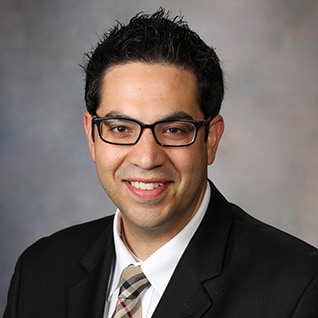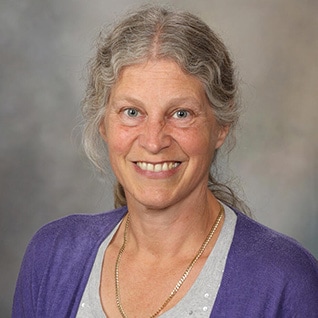/prod01/channel_2/media/mccms/content-assets/academics/residencies-and-fellowships/child-adolescent-neurology-residency-minnesota/Katherine-C.-Nickels-M.D.-512X512.jpg)
Katherine Nickels, M.D.
Associate Professor of Neurology
Interests: Pediatric epilepsy syndromes, treatment, and outcome; teaching EEG
The Department of Neurology at Mayo Clinic is a highly integrated, collaborative department of adult and pediatric neurologists who specialize in the research, diagnosis and treatment of conditions and diseases affecting the nervous system.
Mayo Clinic's neurological clinical material is rich and varied, offering you the opportunity to see both common and unusual neurological and neurosurgical problems.
In addition to caring for patients in their clinical practices, Mayo Clinic's neurology faculty is committed to patient care, education and research in their daily practices. Many faculty members have published and lectured extensively and are highly regarded in their fields. You have direct access to these individuals throughout your training.
Each of the neurology department faculty members belongs to a group of neurological subspecialists who supply unique clinical and research services to patients and colleagues.
The Division of Child and Adolescent Neurology is an integral part of the Department of Neurology and comprises several full-time members with varied expertise including neuro-oncology, sleep disorders, neonatal neurology, epilepsy, headache, movement disorders, neuromuscular disorders, neurometabolic disorders, autism, and developmental disorders and neuroimmunology:
 The goal of our Child Neurology program at Mayo Clinic in Rochester, Minnesota, is to provide the highest quality education in Child Neurology and train future leaders in clinical neurology, neurological education, and neuroscience research.
The goal of our Child Neurology program at Mayo Clinic in Rochester, Minnesota, is to provide the highest quality education in Child Neurology and train future leaders in clinical neurology, neurological education, and neuroscience research.
Our program includes exceptional didactic and bedside education to prepare you for independent practice in any medical setting. We offer an unparalleled curriculum with a multitude of clinical experiences to allow you to gain confidence in successfully diagnosing and treating children with both common and rare neurologic disorders.
The Division of Child Neurology at Mayo Clinic was one of the first child neurology divisions and residency programs in the world, established by pioneers in the field dating back to 1959. You will have the unique opportunity to learn from nationally and internationally known child neurologists, many considered to be expert clinicians, educators, and researchers in their field.
We truly have a diverse and committed faculty, dedicated to the three shields of Mayo Clinic with outstanding patient care, exceptional medical education, and cutting-edge research. We have a strong belief in graduated resident responsibility, with many opportunities to teach and participate in research. Our program offers the flexibility to focus your career as a clinician, clinician-educator, or physician-scientist.
Our residents are a diverse and enthusiastic group of physicians who enjoy time together on and off campus. The size and location of our program naturally lends itself to a sense of community, and we are dedicated to providing a dynamic and supportive environment for residents to thrive in both personally and professionally.
Thank you for your interest in our Child Neurology Residency program. We look forward to discussing your career goals through virtual interviews.
Paul Youssef, D.O.
Child Neurology Residency Program Director
 As the division chair, I am proud to be part of one of the oldest and most respected Child Neurology divisions in the world. Mayo Clinic has a long history in Child Neurology, and has led in clinical excellence, research, and education.
As the division chair, I am proud to be part of one of the oldest and most respected Child Neurology divisions in the world. Mayo Clinic has a long history in Child Neurology, and has led in clinical excellence, research, and education.
I am very proud of our faculty, who have diverse and unique expertise, who are dedicated to the three shields of Mayo Clinic (outstanding patient care, exceptional medical education, and cutting-edge research) and who take a genuine interest in the well-being of each other and our trainees. I am also very privileged to work with such a dynamic and motivated team of residents who have a real passion for Child Neurology.
Our program director, Dr. Youssef, has created an unparalleled didactic curriculum and ensures our residents have the flexibility to focus their careers as clinicians, clinician-educators, or physician-scientists, ensuring they are well-equipped to become the next generation of leaders in Child Neurology.
In choosing to come to Mayo Clinic for your residency training, you will become part of our Child Neurology family and will share and benefit from our historic legacy. Please consider our invitation to train at possibly the best clinical Child Neurology training in the world.
Elaine Wirrell, M.D.
Division Chair, Child Neurology
Professor of Neurology
You are assigned a dedicated faculty adviser who can provide comprehensive educational advice and personal support. Trainees meet with their advisers periodically throughout the program to review their progress and career goals, and ensure that their educational needs are being met. Your adviser also serves as a contact point for introducing you and your family to Rochester, Minnesota, and the Mayo Clinic system.
Many prominent professors visit Mayo Clinic each year. They present their work during lectures, participate in hospital rounds and have informal discussions with trainees. You are encouraged to take full advantage of these educational opportunities.